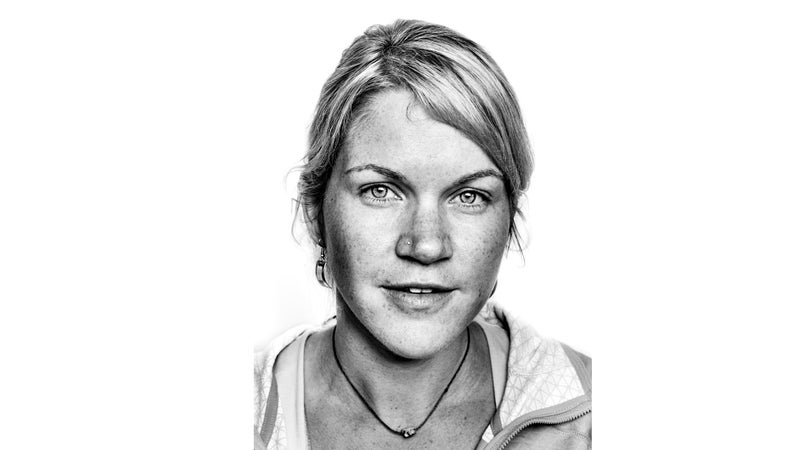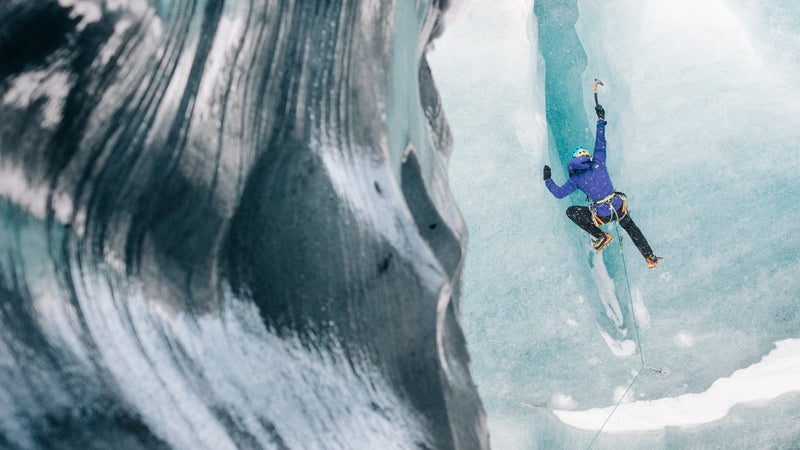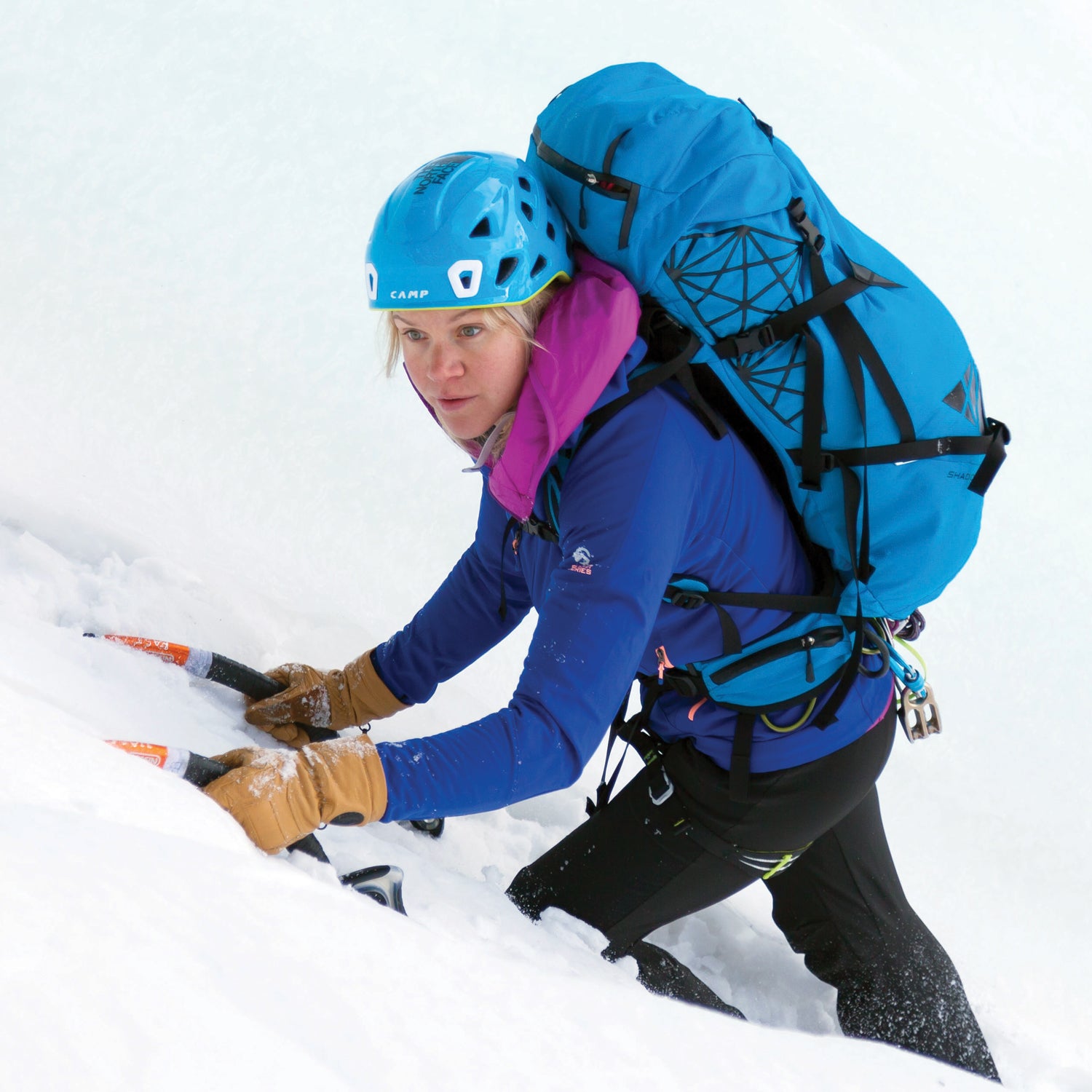Most elite alpinists grow up in tiny mountain towns. , on the other hand, was raised in rural northeast Ohio. “I didn’t do anything outdoorsy until I was 20 or so,” she says. “That’s when I moved to Colorado to finish my nursing degree at the University of Colorado Denver.” Soon after, a few of Pfaff’s classmates invited her to climb with them at , near Moab, Utah, for the weekend. “When I came back from that trip, I did whatever it took to go climbing and be around climbers.”
After graduating in 2003, Pfaff relocated to Boulder and met plenty of locals eager to teach her the systems and intricacies of technical rock climbing. Soon, she was spending most of her free time on either the multi-pitch routes in , a few miles outside of Boulder, or the splitter cracks in Indian Creek. In 2004, Pfaff drove out to Yosemite alone, and was “absorbed by the Camp 4 climbing community,” she says. “They took me under their wing—that’s when it all really started for me.”

Thirteen years later, Pfaff has in India, Bolivia, Nepal, and Columbia, and established new routes in Pakistan and Chile—all while working as a registered nurse in the Bay Area. She signed with the North Face last fall and will join some of her new teammates on an expedition in India this August. “My life isn’t normal in any way,” Pfaff says. “Juggling expedition climbing and nursing requires total commitment. I have two lifestyles—not two careers—but I’m happy with the path I chose. Isn’t that the point?”
Age: 35
Job: Trauma nurse; sponsored alpinist with the North Face, La Sportiva, Blue Water, DeLorme, CAMP, Jubo, and Gnarly
Hometown: Medina, Ohio
Home Base: Oakland, California
Morning Ritual: “Drinking a lot of coffee and making a list for the day.”
Her Perfect Route: “I love mixed climbing, so probably a thin crack up to a nice pillar of WI5 ice.”
2017 International Agenda: Newfoundland in January, Iceland in March, Peru in June, and India in August.
Favorite Piece of Gear: “A yellow . Because if I’m using one, it means I’m climbing a hand crack.”
Nursing Certifications: Registered Nurse, Certified Emergency Nurse, , Pediatric Advanced Life Support, Basic Life Support
Climbing Certifications: “The only class I’ve taken was on basic anchor building, back when I first started climbing. I just kind of learned through mentors and getting out there!”
How to decide if a dual career is right for you: “Having a dual career is my way of focusing on my ultimate goals in life: going on expeditions and helping people. If your dream is juggling nursing and alpinism, it’s best to start both early. Both fields require a lot of experience. Don’t be scared to jump in and figure out your path along the way—I didn’t know I would be an expeditionary alpinist when I started climbing. But here’s the key: you have to be incredibly disciplined to be a trauma nurse or a professional alpinist. For example, I often pass up vacationing with my friends because I need to train for upcoming expeditions.”
Juggling two jobs: “I can walk into the emergency room after being in the mountains for six weeks and handle some crazy trauma like a gunshot wound, but it took me 14 years of training and hard work to get to that point. I just get into a flow and everything else fades into the background until I finish the day’s work. But of course there are certain things in my life that are still a hot mess. Sometimes I’ll freak out and think that I’ve been at the hospital way too long and I need to skip and go climbing. But then when I’ve spent six or seven weeks climbing, I’ll feel this urge to go be a nurse again. It’s always been one extreme or the other with me.”

Day to day: “My contract with the hospital requires me to work at least four shifts per month, but sometimes I work more than that. As a trauma nurse, I deal with anything from gunshot wounds to car accidents. My shifts are 12 hours each, but my schedule is pretty flexible: if I need six months off to climb, I'll do 10 shifts in a row. I live with some emergency room co-workers when I’m in Oakland; kind of like a nursing commune. If I’m not on an expedition but have a good chunk of time to climb, I follow the good weather in my van and sleep in that. Some people probably see living in a van as a sacrifice, but I think of it as freedom.”
How she recharges: “Sleep. Really, that’s the only downtime I have. When I’m not on an expedition, I rotate between sleeping, working at the hospital, and training. I only have a limited amount of money, so I put it almost entirely into keeping my van running and going climbing. I don’t go to bars or anything like that.”
Finding jobs with meaning: “Both of my careers hinge on constant progression: I can always be better. I think the key is to find a field you enjoy that fits your personality. I work in trauma now, but I’ve also done oncology and the intensive care unit. I like dealing with unexpected scenarios all the time, and I thrive on organized chaos. I’ve always had two urges—to help people and be active outside—so I chose careers that fit the lifestyle I knew I wanted. The result has been that my identity hasn’t changed much throughout my careers. But, my careers have definitely reinforced my belief that you have to make the most of every moment. I’ve lost friends in the mountains—two died just last year—and as a trauma nurse, you see people die all the time.”
Staying in elite shape while holding down a hectic job: “There are only 24 hours in the day, so choose wisely what parts of your body you need to train and figure out the most efficient way to do it. I usually train at night, after work. I always have a specific exercise plan, like, ‘I’m going to go to the rock gym and climb ten pitches of 5.10 and 20 pitches of 5.11.’ And I always tailor my training towards upcoming trips. Right now, I’m working out six days a week because I’ll be climbing in Peru soon; after that, I have a trip to India. Alpinism requires pretty much every type of fitness—I run, climb, lift weights, and hangboard, plus do yoga, pull-ups, sit-ups, push-ups…”
How to find happiness and stay inspired: “I think two of the most important rules in life are have fun and remember that life is short. Everybody has a different idea of the perfect life, so you have to figure out what keeps you happy and inspired. Sometimes you need to put your head down and sacrifice for your ultimate goal, but if you’re in the right career, there will still be inspiring moments during that slog. For me, those moments happen when I meet patients who are fighting back against their illnesses or injuries, or when I travel for an expedition and talk to someone who’s facing challenges I’ve never encountered.”
Career highlights: “The 2016 first ascent I did with my friend on in Bolivia comes to mind. I’ve enjoyed being able to push my body to the highest level and seeing how far I can take my climbing. But even more than standing on summits, I love learning about the various cultures, lifestyles, and beliefs that I run into overseas. As for my nursing career, there have been times when my patient seems to be doing fine, but my intuition kicks in and I dig a little deeper and catch something that wasn’t apparent. Also, if a patient comes out of surgery successfully, talking to them when they wake up is phenomenally rewarding.”
Future plans: “I just want to keep training, seeing the world, helping people, and staying alive. This career path works for me right now, and I’m confident that it’s how I want to spend my time. I don’t think it will last forever, but I’m going to continue to do it for as long as I can, and for as long as I love it.”


